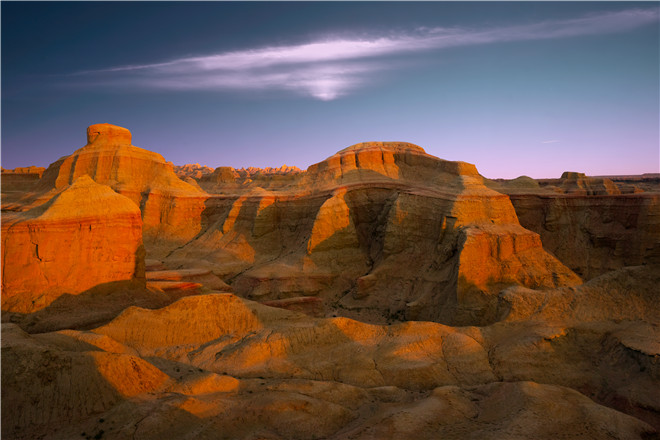Scenic Area of World Ghost Town of Karamay, Xinjiang Uygur autonomous region

Scenic Area of World Ghost Town of Karamay, Xinjiang Uygur autonomous region
(世界魔鬼城景区 shì jiè mó guǐ chéng jǐng qū)
Address: 200 Longji Road, Wu’erhe district, Karamay city, Xinjiang Uygur autonomous region
Scenic Spot Level: AAAAA
Opening Hours:
Winter:10:30-18:30
Summer: 8:00-20:30
Ticket Price:
General admission: 42 yuan ($6.50)/person
Sightseeing vehicle: 20 yuan/person
Notes:
1. Children under the age of 6 (inclusive) or under 1.2 meters (inclusive) in height, senior citizens aged 70 and above, people who have a disability, and servicemen can enter free of charge.
2. Half-price concessions are available for minors aged between 6 (exclusive) and 18 (inclusive), and full-time university undergraduates.
3. Please choose extreme sports according to your health conditions.

Thanks to its typical geological wonder that epitomizes the essential Yardang landform, the World Ghost Town of Karamay is famous for its eccentricity, magnificence, and grandness at home and abroad.
During the Cretaceous period about 100 million years ago, there was a huge freshwater lake at the site. With a warm and humid climate, the area was a paradise for dinosaurs. After dozens of crustal movements, it became today's Gobi territory with groups of flat-topped outcrops and mountains of low elevation. Over millions of years of erosion by wind and rain, gullies in diverse depths, bare rock strata, and softer sandstones were formed. Whenever strong wind blows across this barren rugged territory – as it frequently does -- a roaring sound like a ghost's cries bursts out; hence the scenic area’s name.
The Karamay city area features a variety of wind-eroded rock complexes resembling different architectural structures, humans, birds, and beasts. Its magnificent, mysterious, and ever-changing scenery contributes to its claim as one of the world’s wonders.

The World Ghost Town of Karamay is China’s oldest Yardang landform that was geologically formed. It is world-renowned because of its numerous geological wonders, unique wildlife resources, and well-preserved Mongolian customs. Its wild and desolate landscape keeps drawing photography lovers and tourists from home and abroad.
Last Updated: Feb 05, 2021




